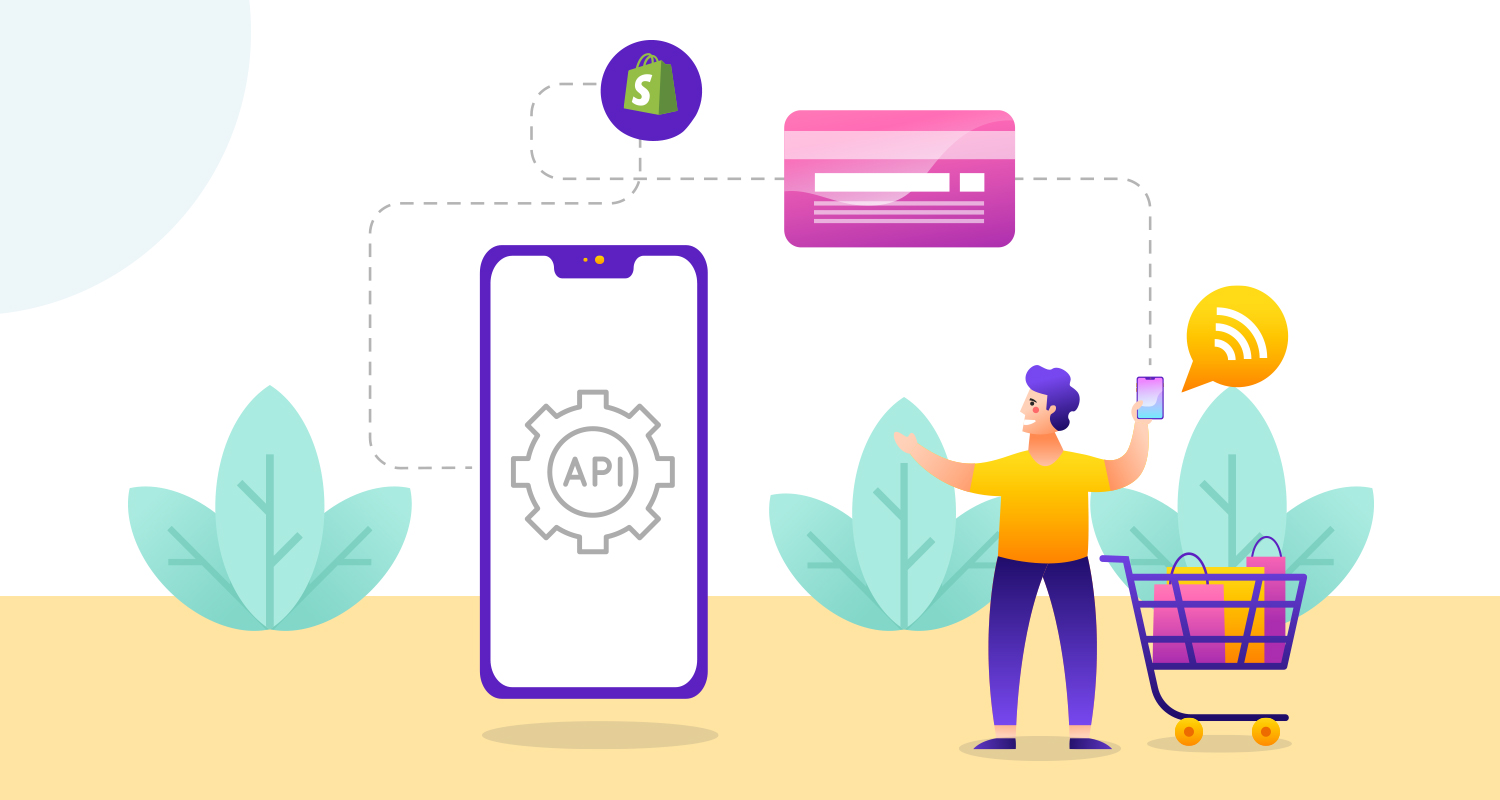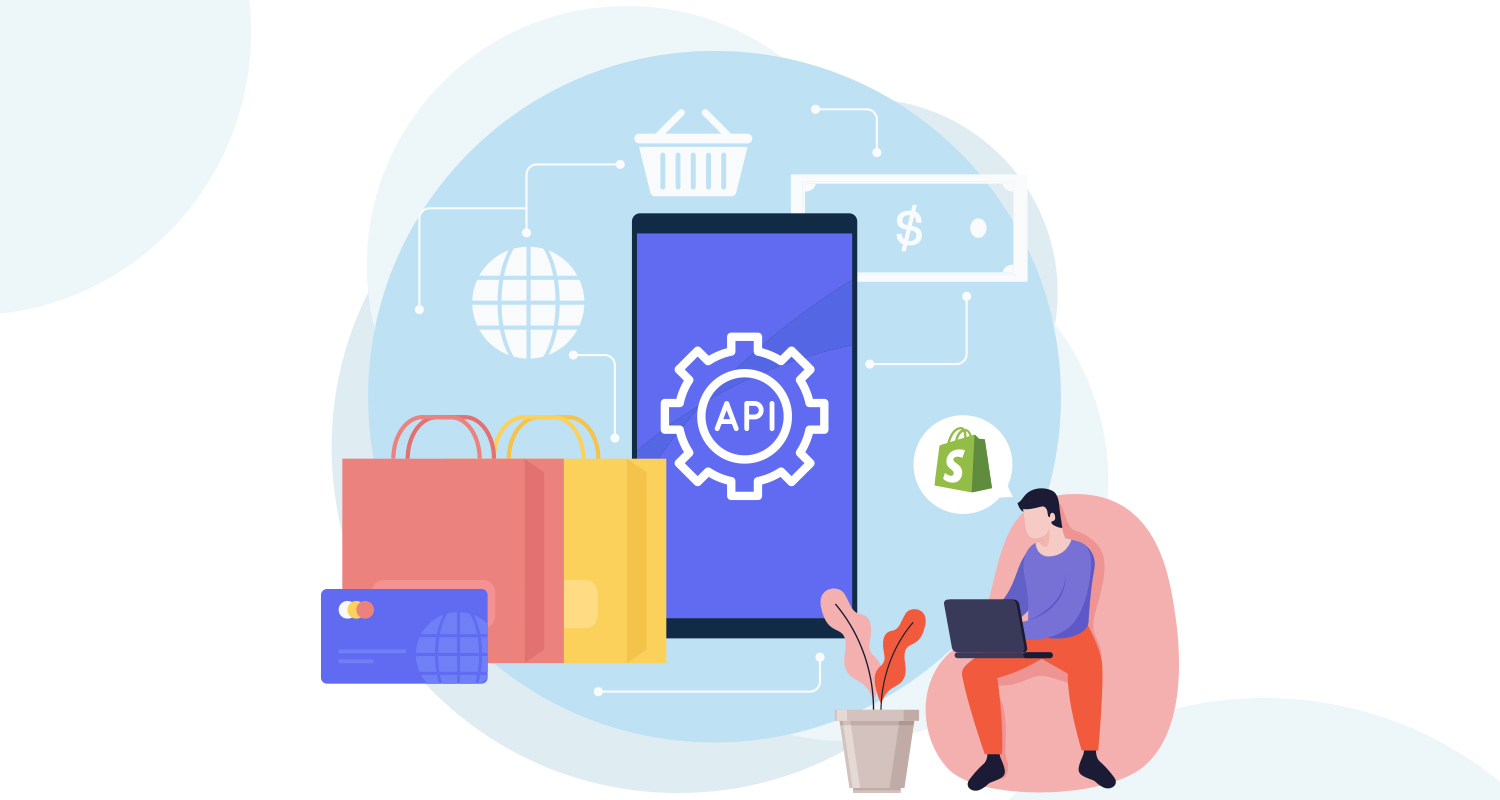Anyone want to build a website in just minutes can actually do it now. Similarly, anyone wants to build a fully equipped eCommerce store can actually build it in less than an hour. All these are possible because the development approach for websites and mobile apps have undergone major shifts. It is now the component-based modular approach that development faster and easier. Well, Application Programming Interfaces (APIs) have emerged as key components for building websites and apps by meeting the user-specific requirements.
Thanks to APIs, web applications of a variety of sectors and niches are now becoming able to build web apps that meet their specific UI requirements and user experience attributes. But the biggest impact of API integration is found in eCommerce stores of various product categories. Shopify being one of the leading eCommerce CMS platforms allows easy API integration to make a whole array of value additions with features and functionalities.
Here through the length of this post, we are going to explain the key roles API integration plays for eCommerce stores and how can a Shopify Development Company India should address this. Apart from evaluating the business impact of APIs, we would also like to have a look at different types of Shopify integration.
What is API Economy and The Role in eCommerce?
API or application programming interface actually help any application (in this case, your eCommerce store) to connect to other applications for certain services such as cataloguing content, order management, price management, customer data management, etc.
Thanks to APIs two apparently different systems can be able to communicate with each other and allows the services provided by one type of application to be accessible by other applications. APIs basically make data and services between different applications accessible for different contexts of use.
Over the years, APIs thanks to the modular approach of connecting and bringing together different applications, helped many industries that do not have the same level of exposure to technologies. This connecting of different applications for contextual uses actually helped boosting efficiency, performance, innovation, growth, and agility of responses. As APIs are increasingly becoming important for many businesses to render services as third-party tools, they generate nearly 25% of revenues for different organizations, as reported by MuleSoft.
Some of the key ways APIs help impacting the businesses and their profitability include the following:
- Bring together and facilitate connections between systems, data, services, people, and algorithms.
- Facilitating the sharing and collaboration of data and information.
- Facilitate transactions through third-party tools.
- Allow and deploy third-party algorithms.
- Authentication of people and connected devices.
- Building new apps, services, and business models.
- Deliver improved user experiences with a lot of value additions.
According to many leading analysts including that of Gartner, APIs are increasing helping many businesses to turn into sought-after platforms and services. By becoming platforms the APIs actually help to boost the creation of value for both users and the businesses behind them. With an increasing number of businesses taking part in the API economy, value creation with a variety of services, products, and information became more rigorous than ever before.
How Ecommerce APIs Can Impact Your Business?
As we have seen, the API economy continues to render a bigger influence on the world of business by making implementations and the creation of new value-driven services across different contexts. Technically, how this value is created? Or to ask the question more objectively, how APIs impact businesses?
Well, for eCommerce stores APIs basically helps to connect a store with a variety of front-end and back-end systems. Some of these systems that APIs help integrating with eCommerce stores include the following.
- Enterprise resource planning (ERP)
- Customer relationship management (CRM)
- Point-of-sale (POS)
- Product information management (PIM)
- Order management system (OMS)
- Warehouse management system (WMS)
- Content management system (CMS)
- Digital experience platform (DXP)
APIs basically help to integrate all these systems into an eCommerce store and equips the store to become more performance-driven, agile, efficient and adaptive. By incorporating all these services APIs actually fulfill all the gaps and shortcomings in the technology stack of an eCommerce store. The best thing about API integration us that you can always choose APIs based upon your specific business needs. Instead of going for the one size fits all approach you can actually customize your eCommerce store by incorporating API that you actually need.
Different Types Of API integration

When it comes to API integration with your Shopify online store, you have a plethora of options. While there is no dearth of API for every different service requirement, a few of them are crucial for the smooth and efficient functioning of an eCommerce store. Let us have a look at the key APIs for integrating with your Shopify eCommerce store.
Analytics API:
An analytics API actually helps your Shopify eCommerce store to integrate any of the major analytics solutions popular for eCommerce stores. The analytics API is basically capable to aggregate eCommerce data of the users of the Shopify platform and deliver reports loaded with data-driven insights. ShopifyQL basically helps your eCommerce app to interact with another analytics platform. ShopifyQL allows you to access a wide variety of user data across different user activities while using the online store.
Tax Service API:
For calculating the tax component of the eCommerce customers in real-time, the Shopify store owners can use Tax Service API. This API basically helps to calculate the tax component of the billing and other transactions based upon the shopping cart rules, location-specific tax rules, etc.
Refund and Transaction API:
The shopping stores using Shopify platform can get a lot of help from the APIs meant for refund and transaction process. A simple API can handle all the refund and transaction-related tasks with ease.
Catalog API:
The catalog API basically helps in creating, editing and managing the product catalogs. Thanks to this API, you can upload thousands of products in minutes time. This API integrated with sales-related APIs such as the API for POS allows smooth transactions.
Login API:
The login API does the job of managing customer identities and login interfaces that needs to allow social login through recognised platforms such as Google, Facebook, etc.
Shopping Cart API:
Shopping cart API is an integral part of the eCommerce store that allows a store managing, viewing and creating the shopping carts of the customers. The API also enables you to incorporate the business logic in the eCommerce application to deal with various tasks such as payment processing, tax calculation, etc.
Checkout API:
A checkout API is crucial to deliver a highly customised shopping experience and boost business conversion and customer engagement. Such an API can also be utilised to deliver a remote checkout experience through a third-party mobile app.
Payment Processing API:
Payment processing API is incorporated into an eCommerce store to facilitate payment processing through credit and debit cards, net banking and other payment gateways and methods.
Sales Tax API:
As sales tax varies across countries, states or even regions, calculating the sales tax without any hassle or complexity becomes a challenge for an eCommerce store addressing a heterogeneous global audience. A sales tax API helps you taking care of this component automatically in eCommerce transactions.
Social Proof API:
As most customers, these days are influenced by social recommendations and opinions while buying products, providing integrated social proof is very important to ensure credibility. A social proof API helps your eCommerce store showcasing the positive reactions and comments for your products and brands.
Marketing Automation API:
There are several marketing tasks eCommerce stores need to undertake from time to time that requires least human intervention because of the availability of quality automation tools. A marketing automation API can help your store taking care of various marketing tasks like building email lists and sending marketing emails based on their browsing history, purchases, etc.
Shipping API:
The shipping API helps an eCommerce store to handle the shipping processes and delivery of the products to the customers in a timely manner. The shipping API basically helps the eCommerce store management to connect to various logistics service providers of the respective locations. It can also help create the shipping labels by fetching data of the customers and respective locations.
Apart from the above-mentioned ones, there are several different types of APIs that can be integrated with the Shopify eCommerce stores for a variety of functional benefits ranging from fraud-control to widget creation to customer data processing.
Key Benefits of Shopify API Integration

Now that we have explained the role of a whole array of APIs for eCommerce stores, the benefits of these APIs have already been clear to us. In spite of this, we need to explain the principal benefits that make APIs so integral part of the eCommerce stores across all platforms including Shopify.
Here are the key advantages of eCommerce store API integration.
Time and Cost Saving:
Shopify being a managed eCommerce platform offers all types of APIs for crucial functions and features. What could happen if Shopify was a fully independent platform that requires building every different feature from scratch? Well, the development cost and time would have been a lot more than what is now for Shopify stores. APIs saves a great time and development cost for eCommerce stores.
Improved Shopping Experience:
In the case of incorporating data manually and for building functions from scratch, there is an increased probability of coding errors that may take a lot of effort and time to check and address. This is where APIs help in delivering better shopping experience by allowing access to data and features.
Data-driven Intelligent Strategy:
APIs help eCommerce stores to get access to the leading analytics engines and intelligent services based on latest technologies like artificial intelligence and Machine Learning. Thanks to sophisticated APIs for analytics and data-driven decision-making tools, eCommerce stores can be more equipped for decision making and eCommerce strategy. Data analytics APIs help eCommerce stores to get the power of data-driven actionable analytics to drive better business outcomes.
Enhanced Customisation Options:
APIs built for specific features and functions keeping with the diverse customer needs in eCommerce environments, can help to incorporate a lot of customisation options as required by the particular eCommerce store. Instead of building features from scratch, an eCommerce store simply can opt for the needful APIs and give a boost to the custom look and feel of the platform.
More Collaborative Development Approach:
Third-party APIs integrated into the eCommerce stores for various features and functions actually helps developers from various backgrounds collaborate for creating modular solutions and making them available for different industry-specific applications. This is why an API built for payment processing can actually be used by a retail shopping store and a booking app.
Conclusion
If you are using Shopify eCommerce platform for your new online store, you must have known about the hundreds of APIs that are ready to integrate eCommerce-specific features and functions to your store. Obviously, as a startup, you may find it a little difficult to choose the appropriate APIs and deliver a seamless shopping experience to your customers. It is advisable to opt for any of the expert shipping api integration services to deal with these challenges.
